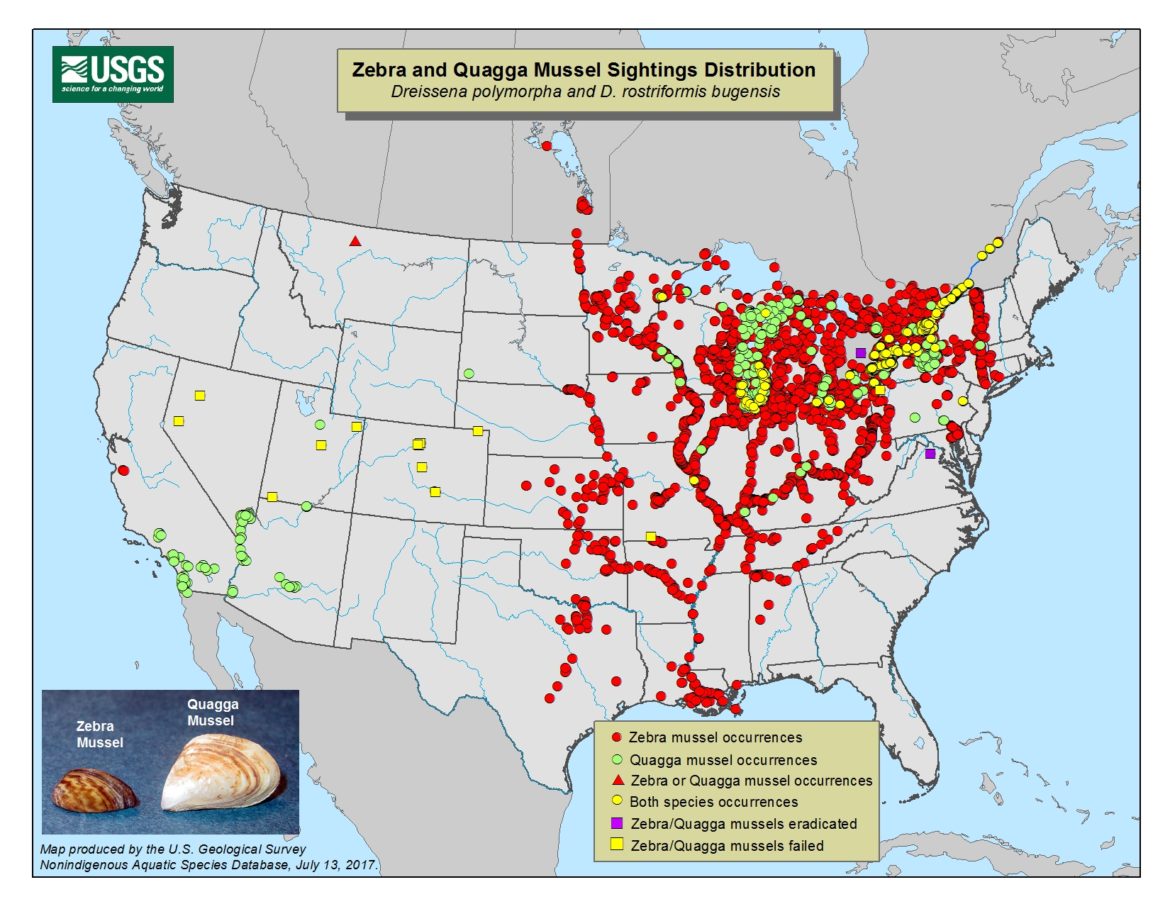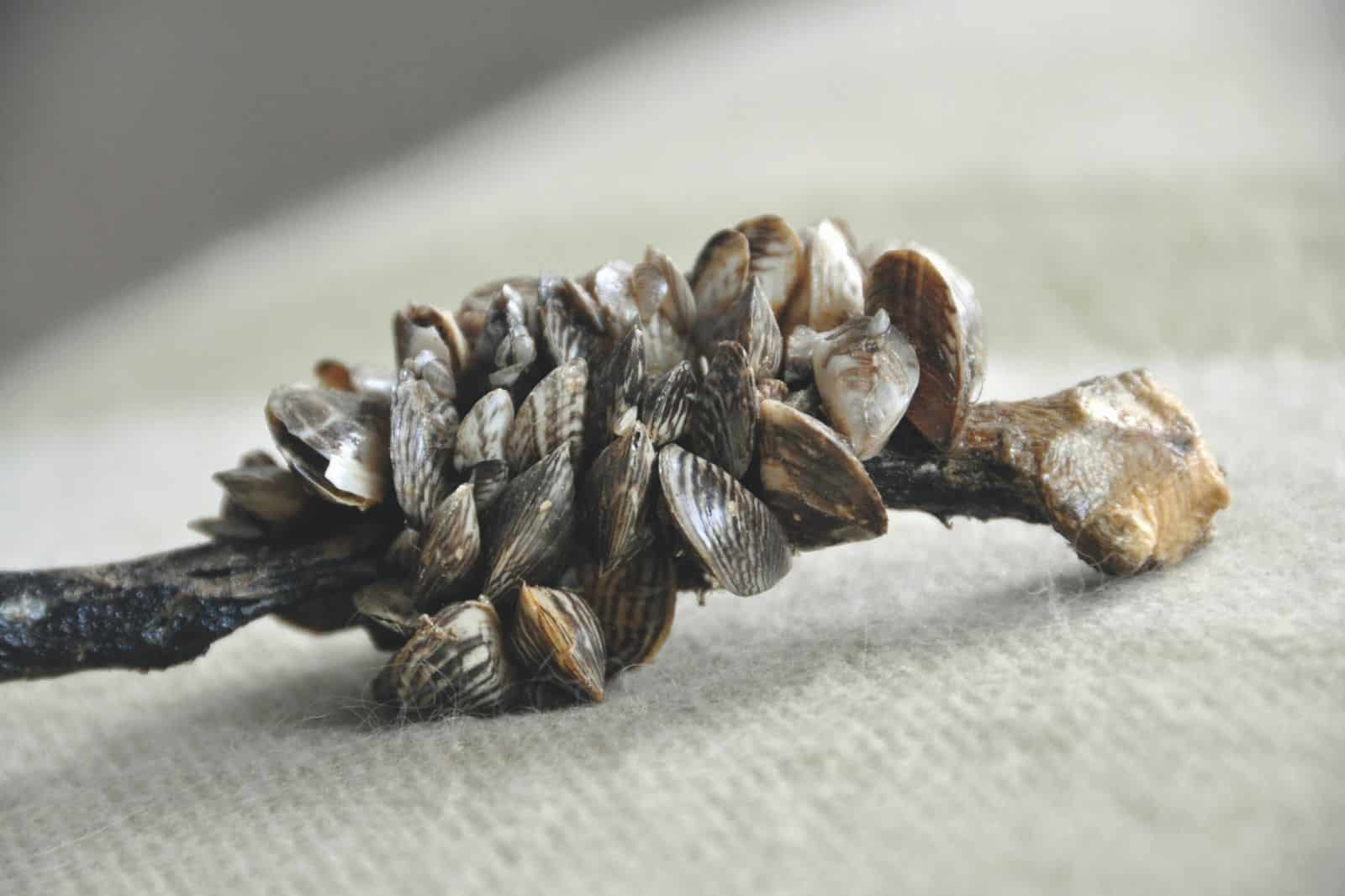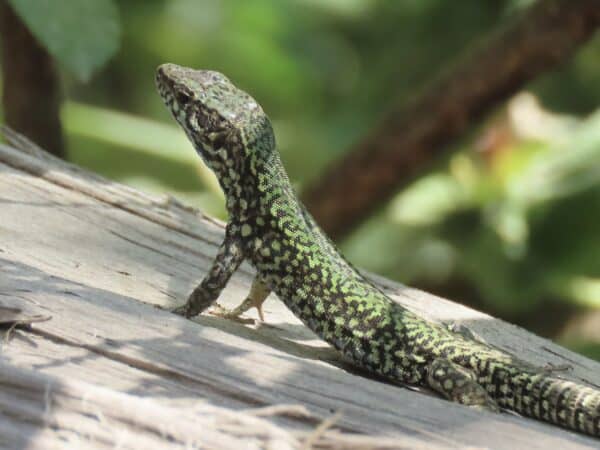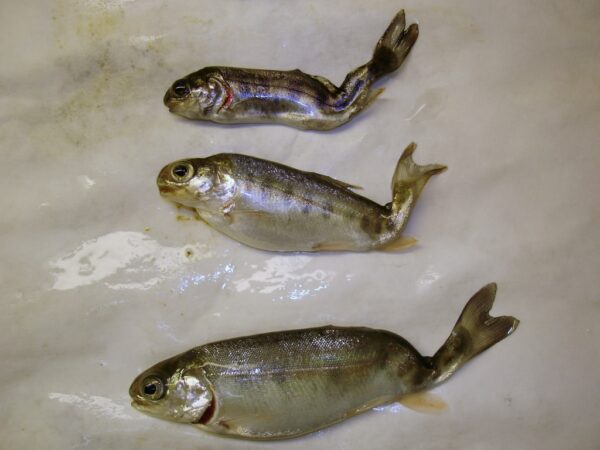Zebra and Quagga mussels are freshwater mussels which are not native to North America but have been spreading across the continent, causing great harm, since their introduction by European boats in the 1980’s.
The good news for British Columbians is that these invasive mussels have not yet established in this province – but they have been found in nearby Montana and Manitoba. Here are six reasons why you should care about Zebra and Quagga mussels and help keep them out of BC!
- Harm to biodiversity
Zebra and Quagga mussels compete with native species for food and habitat. Their diet includes plankton which they eat in large quantities, reducing the food supply available for native species, such as salmon and trout. Their appetite for plankton makes the water clearer, which may appear cleaner, but is harmful as more sunlight penetrates the water, causing aquatic plants to grow much more including harmful algal blooms.
- Potential for injury
Invasive mussels can take over beaches, leaving the shoreline literally littered with razor sharp shells. These easily injure feet making the beach unusable, or at best painful and unenjoyable.
- Nuisance to boaters
Invasive mussels cling to hard surfaces on boats in dense colonies and are extremely tough to remove. They often damage propellers and motors by clogging water intakes.
- Impact on infrastructure
Zebra and Quagga mussel colonies can seriously interfere with municipal water supplies, agricultural irrigation, water treatment, fisheries and hydropower operations by blocking water intakes and other infrastructure.
- Financial cost
Waterfront homeowners and tourism operators feel the impact of Zebra and Quagga mussel invasions with property values falling and tourists voting with their feet by travelling elsewhere. Taxpayers are also affected by mussel invasions. If introduced, the financial impact of invasive mussels to BC is projected to be at least $43 million annually. In comparison, Ontario is already spending from $75 to $91 million per year managing zebra mussels and the estimated annual cost to the Great Lakes to control Zebra mussels in water intake pipes alone is $250 million. This is one financial burden British Columbians can do without.
- Easily spread, hard to remove
Unlike native mussels, Zebra and Quagga mussels easily attach to hard surfaces, allowing them to be moved between water bodies by boats and equipment. Young mussels are very hard to spot as they are only a few mm’s in size. They multiply rapidly and once established; invasive mussels are nearly impossible to fully eradicate from a water body. Currently, there are very limited tools available to attempt to control or eradicate invasive mussels from natural systems without causing harm to other wildlife. Prevention is the best way to protect waters from invasive mussels.

Image: Current distribution of zebra and quagga mussels in North America, U.S. Geological Survey website
There are four key actions British Columbians can take to prevent the spread of Zebra and Quagga mussels, and any other aquatic invasive species in BC.
Always follow the steps of Clean Drain Dry
Before moving your watercraft and gear:
- Clean plants, animals and mud from your boat and gear.
- Drain all water from your boat and gear onto land. Pull all the Plugs!
- Dry all parts of your boat and gear completely.
This goes for all types of watercraft and gear—canoes, kayaks, paddle boards, paddles/ oars, life jackets, waders—not just motorized boats.
Stop at BC’s watercraft inspection stations
The BC Invasive Mussel Defence program helps prevent the introduction of Zebra and Quagga mussels into BC by running initiatives including inspecting boats at stations on BC’s busiest highways. Anyone with a watercraft passing an inspection station in BC is required, by law, to stop. In 2019, 52,000 boats were inspected including 22 mussel fouled boats which were intercepted and cleaned before potentially contaminating one of BC’s beautiful lakes or rivers with invasive mussels.
Check if an out-of-province boat needs decontamination
Anyone bringing a boat from out-of-province is asked to contact the Invasive Mussel Defence Program at COS.Aquatic.Invasive.Species@gov.bc.ca. A team member will determine if your boat is high-risk and if needed, schedule a free decontamination service.
Report suspected contaminated boats
Report boats which you believe may be travelling from out-of-province and potentially carrying invasive mussels to the Report All Poachers and Polluters (RAPP) line (1-877-952-7277). find more information on the BC Invasive Mussel Defence Program here.
You can also help prevent the spread of invasive mussels by spreading the word. Forward or share this article on social media.
About the Clean Drain Dry program in BC:
The Canadian Council on Invasive Species is pleased to work in partnership with the Invasive Species Council of BC and with funding from Fisheries and Oceans Canada in launching the Clean Drain Dry program in BC, as the foundation for a national program. The project aims to encourage boaters and aquatic recreationists, who play a critical role in protecting local watersheds from invasive species, to Clean, Drain, and Dry all boats and equipment. Over a three-year pilot term, resources, signage and a social and digital media campaign will be designed to shift the behaviour of boaters and aquatic recreationists to encourage the practice of Clean, Drain, and Dry.
About the Invasive Species of BC: The ISCBC is dedicated to keeping our landscapes and communities free of invasive species. It provides a coordinated, province-wide approach to reducing the impact of invasive species in BC. The ISCBC unites efforts across the province and collaborates with a variety of partners to develop unique solutions for the wide variety of ecosystems across BC.
About the Canadian Council on Invasive Species: The Canadian Council on Invasive Species works collaboratively across jurisdictional boundaries to support actions and information that can help reduce the threat and impacts of invasive species. Invasive species councils, committees, and coalitions representing provinces and territories across Canada established this federal society to work together to reduce the impact of invasive species across the country.
For media information, please contact:
Gail Wallin
Executive Director, Invasive Species Council of BC
gwallin@bcinvasives.ca
250-305-9161
Share





